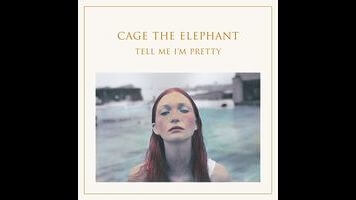Cage The Elephant chills out on the radio-ready Tell Me I’m Pretty

Chances are, you met Cage The Elephant on the radio. It’s where the Kentucky-based five-piece first emerged in 2008, sounding conspicuously similar to the White Stripes, with “Ain’t No Rest For The Wicked” finding success not just on the alternative formats, but placing on pop charts as well. Over the course of the group’s three previous LPs, it’s where the members of Cage have found a reliable residence, accepted amongst rock-faithful for their muscular guitar riffs, melodic hooks, and an easily digestible delivery that’s blanketed in familiarity. Only in seeing the band live, where frontman Matthew Shultz leaps, gyrates, contorts, and stage dives, does any semblance of danger emerge, the sheer enthusiasm of the band transforming its trusty retro vibes into something almost fresh.
But where the radio is an easy island to banish Cage The Elephant to, Tell Me I’m Pretty is the group’s best attempt at looking beyond its afternoon main-stage festival sets. Coming hot off the heels of a Grammy nomination in 2014 for Best Alternative Album for the group’s strongest previous release, Melophobia, the timing couldn’t be better. Still, for a band that has spent a few records trying to shake the Jack White comparisons, it is particularly interesting that Cage employed his archenemy, The Black Keys’ Dan Auerbach, to produce Pretty.
Auerbach’s fingerprints can be seen all over the album’s best moments. “Mess Around” highlights harmonies reminiscent of Danger Mouse’s production of the Keys and is easily the most polished recording of Cage’s career. “Too Late To Say Goodbye” is melodramatic and ominous, harkening to another one of Auerbach’s past collaborators: Lana Del Rey. And both “Cold Cold Cold” and “That’s Right” draw on a Southern California stoney haze akin to the Burger Records garage of The Growlers and Allah Las, a scene that Auerbach has contributed to both directly (he also produced The Growlers) and through his influence.
These songs are effective as standalones and the album does gel into a cohesive statement, but for a group whose identity was finally coming into focus on Melophobia, Cage The Elephant’s signature sound here is obscured. The boisterousness of frontman Shultz is rarely flashed, and when the band is deepest in their comfort zone, on the trotting “Cry Baby” and the smooth croon of “Trouble,” it is uncharacteristically restrained. As the group’s first album without both producer Jay Joyce and lead guitarist Lincoln Parish, the relative calm is easily explained, and it manages to find a cozy corner of being commercial without feeling dumbed-down. These days on the FM dials, that’s a rare feat to achieve.